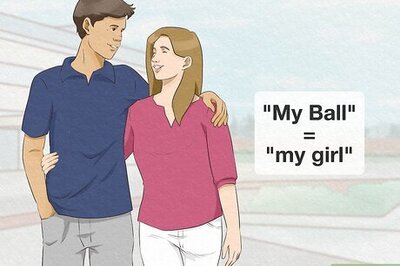
views
New Delhi: At least 100,000 trade unionists marched through New Delhi on Wednesday in a protest against high food prices and unemployment, piling pressure on an administration under fire over corruption scandals.
The demonstration was the biggest in New Delhi in years and included members of a trade union linked to the ruling Congress party, reflecting disquiet within the party over food inflation which hit a high of over 18 per cent last December.
It was also the latest in a wave of protests that have swept the world, ignited by a worldwide spike in food prices. But unlike the protests that have toppled autocratic leaders, there have been no calls to overthrow India’s democratic government.
“We have come here so that our voices reverberate inside the house (parliament) and they can see what pain the common man is going through,” said Akhil Samantray who had come from Orissa to take part in the march.
India, Asia’s third-largest economy and home to more than a billion people, has been grappling with double-digit food inflation for much of last year. The country’s hundreds of millions of poor have been hit the hardest.
The government has looked increasingly helpless as it tries to introduce policies to rein in food prices which have risen mainly on the back of soaring global prices which the government cannot control.
“Prices will kill the common man”, read a banner carried by one of the protesters, one of many in a sea of red flags.
“We get paid Rs 100-125($2-3) a day. How are we going to survive on this if prices are so high?” said Kailash Sain, who had travelled to the capital from Jaipur in Rajasthan.
The protest was a show of strength from the trade unions looking to gain support amid economic pains of Indians who have not benefited from near double-digit growth.
India has more than 9 million trade union members, but their influence has waned after 1991 when the government ushered in economic reforms and began privatising state-run firms.
“The unions have been very weak in the post-reform era, but on this issue they will get widespread sympathy and support. The unions are filling a vacuum not taken up by a political party at the moment,” said Mahesh Ranagarajan, political columnist and Delhi University professor.
PJ Raju, secretary of the Congress’ trade union, told Reuters around 100,000 people from his party alone would be joining the protest.
The grassroots protests may also pile pressure on the government ahead of state elections this year and play into the leftist roots of the Congress Party, which often vies for influence against reformers like Prime Minister Manmohan Singh in the government.
Concerns about governance and regulatory uncertainty, combined with the global slowdown, have hit foreign direct investment and contributed to the Mumbai stock exchange’s recent performance, the worst of the world’s major share markets.
The Reserve Bank of India has raised interest rates seven times in a year to try and tame inflation but has warned fiscal policies would be largely ineffective against rising food prices which stem from bad weather and problems on the supply side.
In one of his strongest warnings over the risk of rising prices, Singh earlier this month said high inflation posed a serious threat to India’s growth plans, adding the country’s farm supply chains had to be boosted with organised retail chains.
Analysts say this may underline shifting opinion within his government that for years has prioritised growth over inflation worries, despite criticism the government was doing too little, too late to rein in prices.
The protests also come only a day after Singh relented to months of opposition demands for a parliamentary probe into a multi-billion dollar scandal over sales of telecoms licences for kickbacks.
The scandals have piled enormous pressure on the reformist 78-year-old Prime Minister, seen as a lame duck who plays second fiddle to Congress party head Sonia Gandhi. Some believe further revelations could force him from power early and lead to an interim leader before a 2014 general election.




















Comments
0 comment